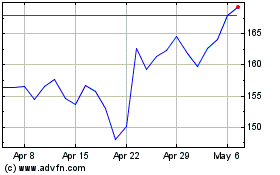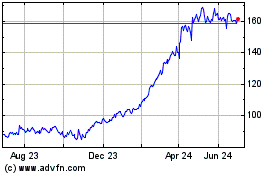GE Chief: Globalization Isn't Over, It Is the End of the 'Global Elite'
February 27 2017 - 7:29AM
Dow Jones News
By Ted Mann
The political world may be roiling with revolt against the
forces of globalization, but General Electric Co. says it isn't
giving up.
In his annual letter to investors, released Monday, Chief
Executive Jeff Immelt said the conglomerate's transformation over
the past decade has enabled it to profit from increasingly
important international markets for its jet engines and power
turbines -- while withstanding a growing political movement against
the economic effects of free trade.
"Are we witnessing the end of globalization? I don't think so,"
Mr. Immelt writes. "It is the end of the 'global elite,' those who
see the world only from financial centers or a website."
By contrast, in Mr. Immelt's telling, GE is expanding its
footprint in foreign markets for its industrial goods, but not
simply seeking out "wage arbitrage" from shifting factories
overseas in search of cheaper labor.
"In this period of nationalization, GE's competitive advantage
will grow. We don't need trade deals, because we have a superior
global footprint," he writes. "We see many giving up on
globalization; that means more for us."
Mr. Immelt also revealed that the continuing pain from low oil
prices -- long a drain on the company's oil and gas unit -- have
pinched executives' pockets as well. The compensation plan for
executives only paid out 80% of its target amounts in 2016, Mr.
Immelt wrote, adding that it will motivate executives to do better
in 2017.
"Normally, we expect our diversified model to shrug off
headwinds in one market and continue to achieve our goals," he
said. "In 2016, we simply couldn't outrun pressure in the resource
markets."
GE's global and U.S. workforce shrunk during 2016, according to
securities filings. GE employed 104,000 people at 184 American
facilities at the end of last year, compared with 125,000 at 206
American factories at the end of 2015.
The company had 30 more factories outside the U.S., which it
said was the result of acquiring the energy business of France's
Alstom SA. GE said its decline in American head count was primarily
due to the sale of its home appliances unit and finance businesses,
as well as job cuts in its oil and gas and locomotive units.
Mr. Immelt's annual missive is an occasion for study by GE
investors, one in which he has in recent years extolled efforts to
transform GE by weaning it off profits from financial services, and
in seeking out new foreign markets for its industrial goods.
One conspicuous absence this year: a promise of $2 in earnings
per share in 2018, a longtime goal of management that has become
increasingly unlikely to be achieved in the view of some Wall
Street analysts.
Jeffrey Bornstein, GE's finance chief, noted in an investor
conference last week that a change in accounting standards would
create a headwind for GE's per-share earnings in 2018. The
response, from analysts at Bernstein Research: "Time for
expectations to reset if they haven't already."
Mr. Immelt said GE can manage its way through a challenging
environment in part by continuing to pare away excess cost. The
company has also snapped up suppliers, including firms that make
3-D printing machines for airplane parts. The result, in Mr.
Immelt's telling, is a more vertically integrated industrial giant
that will own more of the profits from its massive machines when
they are sold.
The letter comes at a sensitive time for corporate executives
unnerved by the rhetoric of President Donald Trump, especially his
willingness to attack companies that have shifted jobs outside the
U.S., or even simply expanded existing facilities in other
countries.
Mr. Immelt has so far shown a knack for avoiding Mr. Trump's
Twitter ire while maneuvering close enough to influence the
administration on areas of GE's interest, like corporate tax
reform. Mr. Immelt made his first visit to the Trump White House
last week, where he and the president shared an anecdote for the
cameras about Mr. Trump hitting a hole in one.
Other industrial executives haven't been as lucky. United
Technologies Corp., parent of Carrier Corp., told investors earlier
this month that it was planning a six-month pause in facility
restructuring, as it awaits the outcome of the Trump
administration's planned tax overhaul.
"Over the past generation, the U.S. has done very little to help
our manufacturers or workers," Mr. Immelt writes, arguing that
current tax policies favor imports, regulations have expanded and
infrastructure is subpar. "We are hopeful the new administration
will 'level the playing field' for U.S. companies."
Write to Ted Mann at ted.mann@wsj.com
(END) Dow Jones Newswires
February 27, 2017 07:14 ET (12:14 GMT)
Copyright (c) 2017 Dow Jones & Company, Inc.
GE Aerospace (NYSE:GE)
Historical Stock Chart
From Mar 2024 to Apr 2024

GE Aerospace (NYSE:GE)
Historical Stock Chart
From Apr 2023 to Apr 2024
